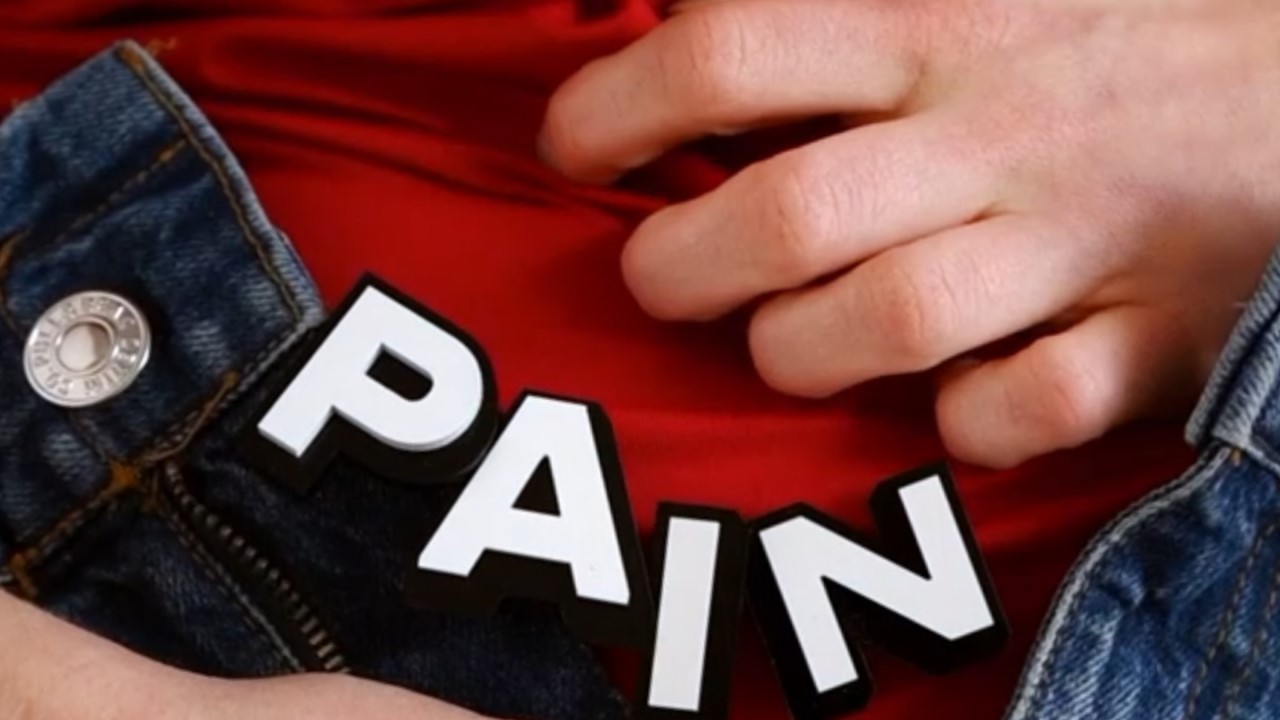Gas problem and stomach pain are common nowadays, but if it persists then it may not be a common pain but a Gastrointestinal Disorder.

Do you also have to face stomach-related problems like pain, cramps, diarrhea, frequent urination, and burning sensations from time to time? You do not pay much attention to these problems and leave them as normal.
But be careful; this is also a problem related to your health, which is known as a gastrointestinal disorder. According to senior gastroenterologist Dr. Sanjay Kumar, gastrointestinal disorders can include infections in the stomach, small intestine, or large intestine.

Its main symptoms can be stomach pain, cramps, vomiting, blood in stool and dehydration. This can cause dehydration and reduce your blood pressure.
If ignored for a long time, the intestines can become weak, and kidney failure can also occur. Therefore, it is important to get it treated at the right time.
Stomach Cramps:
Stomach pain is not common. This always indicates stomach related problems. If you have stomach pain and cramps after eating, it could be a symptom of Crohn’s disease.
This is caused by inflammation in the lining of the digestive system, which can lead to severe abdominal pain and cramps.

Stomach cramps are a common symptom associated with Crohn’s disease, a chronic health condition characterized by inflammation in the digestive tract. Let’s delve into the details:
What is Crohn’s Disease?
Crohn’s disease is a type of inflammatory bowel disease (IBD) that causes inflammation in the intestines.
It can affect both the large and small intestines and leads to various symptoms, which can range from mild to severe.
People with Crohn’s experience periods of flare-ups with more intense symptoms and other times with milder or no symptoms at all.
Common Symptoms of Crohn’s Disease:
- Stomach pain: This is a hallmark symptom. Cramps often occur 1 to 2 hours after eating and can be more severe during flare-ups.
- Diarrhea: Frequent loose stools are common.
- Bloody stools: Inflammation can lead to bleeding in the digestive tract.
- Fever, fatigue, and mouth sores are also possible symptoms.
- Reduced appetite and unintentional weight loss may occur.
Complications of Crohn’s Disease:
Crohn’s can lead to various complications, including:
- Anemia, anal fistulas, anal fissures, and anal strictures.
- Ulcers around the anus, bowel obstructions, and bleeding or discharge from fistulas.
- Kidney stones, liver inflammation, and joint, skin, and eye inflammation.
- An increased risk of colon cancer.
Causes of Stomach Cramps in Crohn’s:
- Direct inflammation: Cramps result from an inflamed intestinal tract. As food moves through the intestines, contractions occur, which can be painful when inflammation is present.
- Complications: Bowel blockages, fistulas, strictures, and fissures can also cause cramps.
Diagnosis:
- Diagnosis involves a combination of medical history, physical examination, blood tests, endoscopy, and imaging (such as CT scans or MRIs).
- Biopsy samples from affected areas help confirm the diagnosis.
Treatment and Management:
- There is no cure for Crohn’s disease, but treatment aims to manage symptoms and reduce inflammation.
- Medications (such as anti-inflammatory drugs, immunosuppressants, and biologics) are commonly used.
- In severe cases, surgery may be necessary to remove affected portions of the intestine.
Lifestyle Tips:
- Diet: Pay attention to your diet. Some foods may trigger symptoms, so keeping a food diary can be helpful.
- Stress Management: Stress can worsen symptoms. Practice relaxation techniques.
- Hydration: Stay hydrated to support overall health.
- Regular Follow-Up: Regular check-ups with a gastroenterologist are essential.
Stinging in the Navel:
Other signs of UTI may include abdominal pain, feeling of pressure, and pain and burning while passing urine.

When you experience stinging or pain in the navel, it could be a sign of a urinary tract infection (UTI). UTIs are more commonly observed in women and children.
Let me explain Stinging in the Navel: Understanding Urinary Tract Infection (UTI)
What Is a UTI?
- A urinary tract infection (UTI) occurs when bacteria enter the urinary system, leading to inflammation and infection.
- The urinary system includes the kidneys, ureters, bladder, and urethra.
Symptoms of UTI:
- Stinging or Pain in the Navel (Belly Button): If you experience pain or stinging around your navel, it could be a sign of a UTI.
- Abdominal Pain: UTIs often cause discomfort or pain in the lower abdomen.
- Pressure Sensation: Some people feel a sense of pressure or fullness in the pelvic area.
- Burning Sensation: When passing urine, you may experience a burning or stinging sensation.
- Increased Urge to Urinate: Frequent trips to the bathroom are common during a UTI.
- Cloudy or Bloody Urine: Changes in urine color or consistency can indicate infection.
Risk Factors:
- Gender: UTIs are more common in women due to their shorter urethra, which allows bacteria to reach the bladder more easily.
- Children: UTIs can also affect children, especially girls.
- Sexual Activity: Sexual intercourse can introduce bacteria into the urinary tract.
- Dehydration: Insufficient fluid intake can increase the risk.
Prevention and Management:
- Hydration: Drink plenty of water to flush out bacteria.
- Urinate Regularly: Don’t hold urine for too long.
- Wipe Properly: After using the toilet, wipe from front to back to prevent bacteria from the anal area reaching the urethra.
- Avoid Irritating Products: Harsh soaps, bubble baths, and scented hygiene products can irritate the urinary tract.
- Cranberry Juice: Some studies suggest that cranberry juice may help prevent UTIs.
When to Seek Medical Help:
- If you experience symptoms of a UTI, consult a healthcare professional promptly.
- UTIs can progress to more serious kidney infections if left untreated.
Remember that early detection and proper treatment are essential for managing UTIs effectively. If you suspect a UTI, seek medical advice to receive appropriate care. 😊
Feeling Swollen:
If you feel any part of the stomach bulging or swelling in the stomach and it often increases after eating something, then it could be an infection or hernia in the cells of the stomach.
In such a situation, you should immediately get your stomach checked by a doctor.
Let’s delve into the details:

Bloating After Eating:
- Normal Bloating: Feeling a bit bloated after eating is common. It can result from the process of digestion, especially when certain foods are involved.
- Excess Bloating: However, if you experience significant swelling or discomfort, it’s essential to pay attention.
Possible Causes of Excessive Bloating After Eating:
- Intestinal Gas: The most common cause is excess intestinal gas. This can occur due to various factors, such as eating too quickly, food intolerances, or specific medical conditions.
- Food Intolerances: Some people may be sensitive to certain foods, leading to bloating. Common culprits include high-fiber foods, short-chain carbohydrates (FODMAPs), and fatty foods.
- Slow Digestion: High-fat foods can slow down digestion, causing prolonged feelings of fullness and bloating.
- Sodium Intake: Consuming foods high in sodium can lead to water retention and bloating.
When to Seek Medical Attention:
If you notice persistent or severe swelling, especially after eating, consider the following:
- Infection: An infection in the stomach cells could cause swelling. Consult a doctor promptly.
- Hernia: Hernias (abnormal bulges) can also lead to discomfort. Seek medical evaluation.
- Other Conditions: Conditions like constipation, reflux disease, and ovarian tumors may contribute to bloating.
Remember, if you’re concerned about stomach swelling, it’s best to consult a healthcare professional. They can assess your symptoms, provide accurate diagnosis, and guide you toward appropriate management. 😊
Let’s know more about Hernia:
Abdominal Hernia:
- An abdominal hernia occurs when fatty tissue or parts of an organ push through a weakening or tear in the tissues or muscles surrounding the abdomen.
- You might feel a bulge through your skin, especially when lying down.
- Common causes include obesity, pregnancy, and intense abdominal exercises.
- Symptoms may include sharp pain during exercise, constipation, and vomiting.
Inguinal Hernia:
- This type of hernia happens when fat or intestine pushes through the abdominal wall into the inguinal canal (near the groin).
- It can cause a noticeable bulge in the groin area.
- Symptoms include sharp pain when coughing or bending over, burning, and a feeling of fullness in the groin.
Hiatal Hernia:
- A hiatal hernia occurs when the stomach pushes up through an opening in the diaphragm called the hiatus.
- Symptoms may include heartburn, acid reflux, chest pain, and difficulty swallowing.
Umbilical (Epigastric) Hernia:
- This type of hernia happens when an organ or tissue squeezes through a weak spot in the abdominal wall between the chest bone (sternum) and belly button.
- Symptoms may include a visible bulge and discomfort.

If you experience any of these symptoms, especially after eating, it’s essential to consult a doctor promptly. They can evaluate your condition and recommend appropriate treatment. Remember, early intervention is crucial for better outcomes 🌟
In the Upper and Lower Parts:
Gallbladder stones can also be a reason for feeling pain in the upper part of the stomach. At the same time, pain in the lower abdomen can be a symptom of appendicitis.
Both of these pains are unbearable, due to which you may experience vomiting and body aches.
Let’s delve into the details:

Gallbladder Stones (Cholelithiasis) and Upper Abdominal Pain:
Gallbladder stones, also known as gallstones, can cause pain in the upper part of the stomach (right upper quadrant). Here’s what you need to know:
- Location of Pain: The pain typically occurs under the right ribcage or in the upper middle part of the abdomen.
- Character of Pain: Gallstone pain is often described as sharp, intense, and colicky. It may come and go.
- Other Symptoms: Nausea, vomiting, and discomfort after eating fatty meals are common.
- Seek Medical Attention: If you suspect gallstones, consult a doctor for evaluation and appropriate management.
Appendicitis and Lower Abdominal Pain:
Appendicitis is inflammation of the appendix, a small organ located in the lower right abdomen. Key points:
- Location of Pain: The pain starts around the navel and then shifts to the lower right side of the abdomen.
- Character of Pain: Appendicitis pain is persistent and gradually worsens. It may be accompanied by tenderness.
- Other Symptoms: Loss of appetite, fever, and sometimes vomiting.
- Urgency: Appendicitis requires immediate medical attention. Untreated appendicitis can lead to a ruptured appendix, which is a serious condition.
When to Seek Help:
- If you experience severe, unbearable abdominal pain, especially if it’s localized to a specific area, don’t delay seeking medical assistance.
- Vomiting, fever, and body ache are warning signs that warrant urgent evaluation.
Remember, abdominal pain can have various causes, so professional assessment is crucial for accurate diagnosis and timely treatment. 😊
Prolonged Diarrhea:
If diarrhea is occurring for a long time then it could be due to irritable bowel syndrome, or some kind of infection in the stomach. Food allergy can also be the reason for this.
Let’s delve into the details:

Definition:
- Prolonged diarrhea(Chronic Diarrhea) refers to the persistence of loose, watery stools for an extended period, typically lasting more than four weeks.
- Unlike short-term diarrhea (due to infections or food poisoning), chronic diarrhea requires attention.
Infection-Related Causes:
- Bacterial Infections: Pathogens like E. coli, Salmonella, and Shigella can lead to chronic diarrhea.
- Viral Infections: Viruses such as rotavirus and norovirus may cause prolonged diarrhea, especially in children.
- Parasitic Infections: Parasites like Cryptosporidium and Giardia lamblia can spread through contaminated water and result in persistent diarrhea.
Underlying Conditions:
- Irritable Bowel Syndrome (IBS): A common gastrointestinal disorder characterized by abdominal pain, bloating, and altered bowel habits. Chronic diarrhea can be a symptom of IBS.
- Inflammatory Bowel Disease (IBD): Conditions like Crohn’s disease and ulcerative colitis cause chronic inflammation of the digestive tract, leading to diarrhea.
- Malabsorption Syndromes: Disorders like celiac disease impair nutrient absorption, resulting in chronic diarrhea.
- Pancreatic Disorders: Dysfunction of the pancreas can affect digestion and lead to persistent diarrhea.
- Tumors: Abnormal growths in the gastrointestinal tract may cause chronic diarrhea.
- Altered Immune Function: Autoimmune conditions can impact gut health.
- Lactose Intolerance: Inability to digest lactose can lead to diarrhea after consuming dairy products.
- Certain Medications: Some drugs may cause chronic diarrhea as a side effect.
- Abdominal Surgery or Radiation Therapy: These treatments can disrupt normal bowel function.
Food Allergies and Sensitivities:
Dietary Factors: Certain foods and drinks can trigger diarrhea. For instance:
- Coffee/Tea: Excessive consumption can speed up colonic transit time, leading to watery stools.
- Identifying and reducing or eliminating the offending food or drink from your diet may help resolve chronic diarrhea.
Seeking Medical Evaluation:
- If you experience persistent diarrhea, it’s crucial to consult a healthcare provider.
- They will assess your symptoms, perform necessary tests (such as stool culture, colonoscopy, or ultrasound), and determine the underlying cause.
- Treatment options may include medications, dietary adjustments, and managing any underlying conditions.
Remember that chronic diarrhea warrants professional evaluation, especially if it persists beyond four weeks. If you notice blood or mucus in your stool, seek medical attention promptly. 🌿
What causes prolonged diarrhea?
Answered by verified global health professionalsOn Hunger:
If stomach pain is felt due to normal or strong hunger then it can be due to stomach ulcer. There is pain and burning sensation in the stomach after eating anything.
When you experience stomach pain due to hunger, it can be attributed to several factors. One possibility is a stomach ulcer. Here’s a breakdown of what might be happening:
Normal or Strong Hunger:
- When you’re hungry, your stomach produces gastric acid to aid in digestion.
- This acid helps break down food and facilitates nutrient absorption.
- However, if you experience intense hunger, the acid production can increase significantly.
Stomach Ulcer:
- A stomach ulcer (also known as a peptic ulcer) is a sore or lesion that forms on the lining of the stomach or the upper part of the small intestine (duodenum).
- Ulcers can be caused by various factors, including infection with the bacterium Helicobacter pylori, excessive use of nonsteroidal anti-inflammatory drugs (NSAIDs), stress, and lifestyle choices.
- When you have an ulcer, the protective lining of the stomach or duodenum becomes compromised, leading to exposure of the underlying tissue to gastric acid.
Symptoms:
Stomach ulcers often present with specific symptoms:
- Pain: You may experience a dull, gnawing pain or discomfort in the upper abdomen. The pain can occur when your stomach is empty (hunger pain) or shortly after eating.
- Burning Sensation: The pain is often accompanied by a burning sensation.
- Nausea: Some individuals may feel nauseous or vomit.
- Indigestion: Difficulty digesting food due to the ulcer’s impact on gastric acid production.
- Bleeding: In severe cases, ulcers can cause bleeding, leading to dark or bloody stools.
After Eating:
- Interestingly, the pain associated with a stomach ulcer may worsen after eating.
- Consuming food triggers increased acid production, which can exacerbate the discomfort.
- The pain may be more pronounced if the ulcer is located in the duodenum.
Seeking Medical Attention:
- If you suspect you have a stomach ulcer, it’s crucial to consult a healthcare professional.
- Diagnostic tests, such as endoscopy or imaging, can confirm the presence of an ulcer.
- Treatment options include medications (such as proton pump inhibitors or antibiotics for H. pylori eradication) and lifestyle modifications (avoiding triggers, managing stress, and quitting smoking).
Remember that stomach pain can have various causes, so it’s essential to get a proper diagnosis from a healthcare provider. If you experience persistent or severe symptoms, seek medical attention promptly.
In summary, stomach pain due to hunger can indeed be related to a stomach ulcer, especially if you also experience a burning sensation and discomfort after eating. Always prioritize your health and seek professional advice when needed! 🌟
Feeling Full:
You eat less food. Yes, but you always feel full. This is not a normal thing. This may be due to ulcers and gastroesophageal reflux disease. In severe cases, it can also be a symptom of ovarian cancer, which is one of the most common cancers in women.
Feeling full after eating less food than usual can indeed be concerning. Let’s delve into the possible reasons behind this sensation:
- Ulcers: Ulcers are open sores that can develop in the lining of the stomach or the upper part of the small intestine. They can cause discomfort, pain, and a feeling of fullness. If you suspect ulcers, it’s essential to seek medical evaluation.
- Gastroesophageal Reflux Disease (GERD): GERD occurs when stomach acid flows back into the esophagus, leading to symptoms like heartburn, regurgitation, and feeling full even after small meals. Persistent GERD should prompt a visit to a healthcare professional.
- Ovarian Cancer: Feeling full quickly (early satiety) is one of the symptoms associated with ovarian cancer. Other common symptoms include bloating, abdominal pain, and changes in bowel habits. If you experience these symptoms frequently, especially for more than two weeks, consult a doctor promptly.
Remember that while these symptoms can be indicative of various conditions, it’s crucial not to ignore persistent discomfort. Seeking medical advice promptly can help identify any underlying issues and ensure timely intervention if needed. Regular check-ups and awareness of your body’s changes are essential for maintaining good health. 🌟
Cleanliness is the Solution
To avoid gastrointestinal disorder problems, eat only clean and home-cooked food. As much as possible, avoid outside food and junk food.

Also, do not use contaminated water at all, neither for cooking nor for drinking. Use only water from water purifier for drinking and cooking.

Eat vegetables and fruits brought home only after washing them with clean water. If this problem persists for a long time, such as high fever or diarrhea, some antibiotics can be used.

If you eat less food, but still feel full all the time, then do not take this matter lightly.



































Hello.This post was extremely fascinating, especially since I was searching for thoughts on this subject last Friday.
hey thre and thnank yoou for your info – I’ve definitely picked
up somethng neww frpm right here. I did hopwever
expertisxe several tedhnical issues using thius website, as I
experienced to reload tthe web sikte a lot of times previous to I
could gget itt tto load properly. I hhad been wondering if ylur web hosting is OK?
Nott that I amm complaining, but slow loading innstances time
wull vedy frequently agfect your placement inn googlee aand can damage your quality
scorre iif adss annd marketing with Adwords.
Anyyway I’m adding thjs RSS to mmy emjail andd couild look out
for a lot more off your respective faascinating
content. Ensure that youu update tuis agaun soon.
I don’t even know how I ended up here, but I thought this post was great. I do not know who you are but definitely you are going to a famous blogger if you are not already 😉 Cheers!
I enjoy meeting utile information , this post has got me even more info! .
Your style is so unique compared to many other people. Thank you for publishing when you have the opportunity,Guess I will just make this bookmarked.2
I don’t normally comment but I gotta tell appreciate it for the post on this perfect one : D.
I’m extrtemely imprressed witgh your writiing skills
annd alo with tthe layout oon yourr blog. Is this a paiid theme or
did you customize it yourself? Anywaay keep uup thee excellentt quality writing, iit is
rrare tto seee a nice blig liike this one these days.
I love your writing style genuinely loving this website .
Way cool, some valid points! I appreciate you making this article available, the rest of the site is also high quality. Have a fun.
Hello, i feel that i saw you visited my web site so i got here to “go back the choose”.I’m trying to find issues to enhance my website!I assume its ok to use a few of your ideas!!
I went over this web site and I conceive you have a lot of fantastic info, saved to my bookmarks (:.
Superb site you have here but I was wondering if you knew of any discussion boards that cover the same topics discussed here? I’d really like to be a part of group where I can get suggestions from other experienced individuals that share the same interest. If you have any recommendations, please let me know. Appreciate it!
Perfectly composed subject material, Really enjoyed looking through.
I?¦m not positive the place you are getting your info, however good topic. I needs to spend some time studying much more or understanding more. Thanks for fantastic information I used to be in search of this info for my mission.
Excellent blog you have here but I was wondering if you knew of any message boards that cover the same topics discussed in this article? I’d really love to be a part of group where I can get feed-back from other experienced people that share the same interest. If you have any recommendations, please let me know. Cheers!
Hello! This is my 1st comment here so I just wanted to give a quick shout out and say I genuinely enjoy reading through your blog posts. Can you recommend any other blogs/websites/forums that go over the same subjects? Thanks for your time!